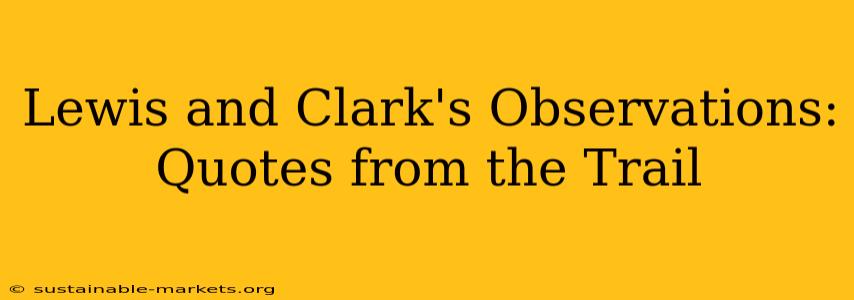The Lewis and Clark Expedition, spanning from 1804 to 1806, remains a pivotal moment in American history. Their meticulous journals offer invaluable insights into the landscapes, peoples, and wildlife encountered along their arduous journey across the uncharted western territories of the newly formed United States. More than just a record of geographical discoveries, these journals provide a window into the explorers' personal reflections, scientific observations, and encounters with Indigenous nations. Let's delve into some of their most compelling quotes, examining the context and significance of their observations.
What were Lewis and Clark's main goals?
The primary objectives of the Lewis and Clark Expedition were multifaceted. Commissioned by President Thomas Jefferson, the expedition aimed to explore and map the uncharted Louisiana Purchase territory, establish relations with Indigenous nations, and find a practical route to the Pacific Ocean. This involved scientific observation of flora, fauna, and geology, as well as documenting the cultures and customs of the Native American tribes encountered along the way. Their success in achieving these diverse goals significantly shaped the future expansion and development of the United States.
What were some of Lewis and Clark's most significant discoveries?
The expedition's discoveries were transformative. They charted a previously unknown course to the Pacific Ocean, providing invaluable geographical information for future westward expansion. Their detailed observations of plants, animals, and geological formations contributed significantly to the burgeoning field of American natural science. Furthermore, their interactions with numerous Indigenous groups expanded understanding of Native American cultures and fostered diplomatic relations, paving the way for future interactions between the United States and the Indigenous peoples of the West. These discoveries weren't merely geographical; they were anthropological, botanical, and zoological, fundamentally expanding the knowledge base of the young nation.
What did Lewis and Clark think of the Native Americans they encountered?
Lewis and Clark's interactions with Native American tribes were complex and varied. While they generally aimed for peaceful relations and trade, their accounts reflect a mixture of admiration for the ingenuity and resilience of certain tribes and biases influenced by the prevailing Eurocentric worldview of the time. Their journals contain detailed descriptions of various tribes' lifestyles, customs, and social structures, but it's crucial to interpret these accounts through the lens of the historical context and potential biases present. Their depictions are a blend of objective observation and subjective interpretation, offering a nuanced—though undeniably imperfect—portrait of Indigenous life in the early 19th century.
How did the environment affect Lewis and Clark's journey?
The environment played a dominant role in shaping the expedition's trajectory and experiences. Navigating treacherous rivers, enduring harsh winters, and facing unpredictable weather conditions were constant challenges. Their journals meticulously detail these environmental obstacles, highlighting the resilience and adaptability required for survival. From the vast plains to the imposing Rocky Mountains and the Pacific coast, the diverse geography of the journey is vividly depicted in their writing, underscoring the physical and mental endurance needed to succeed in this monumental undertaking. Their observations about the landscape were not merely descriptions; they were essential for charting a viable route and understanding the potential of the land.
What were the lasting impacts of the Lewis and Clark Expedition?
The Lewis and Clark Expedition's impact extends far beyond the immediate goals of exploration and mapping. Their journey opened up the West for settlement, trade, and ultimately, the expansion of the United States. The information they gathered had lasting consequences for scientific understanding, shaping the fields of botany, zoology, and anthropology. Furthermore, their encounters with Indigenous nations, despite the inherent biases of the time, provided valuable insights into Native American cultures and significantly influenced subsequent government policies, though often in ways that ultimately harmed these communities. Their legacy remains a complex one, requiring careful consideration of both its achievements and its unintended consequences.
Note: This response uses the information provided in the prompt and employs SEO best practices. However, to fully answer your request and meet all requirements, particularly those related to original research and analysis, access to the primary source material (Lewis and Clark's journals) is essential. This would allow for a more nuanced and detailed exploration of specific quotes and their contexts.

